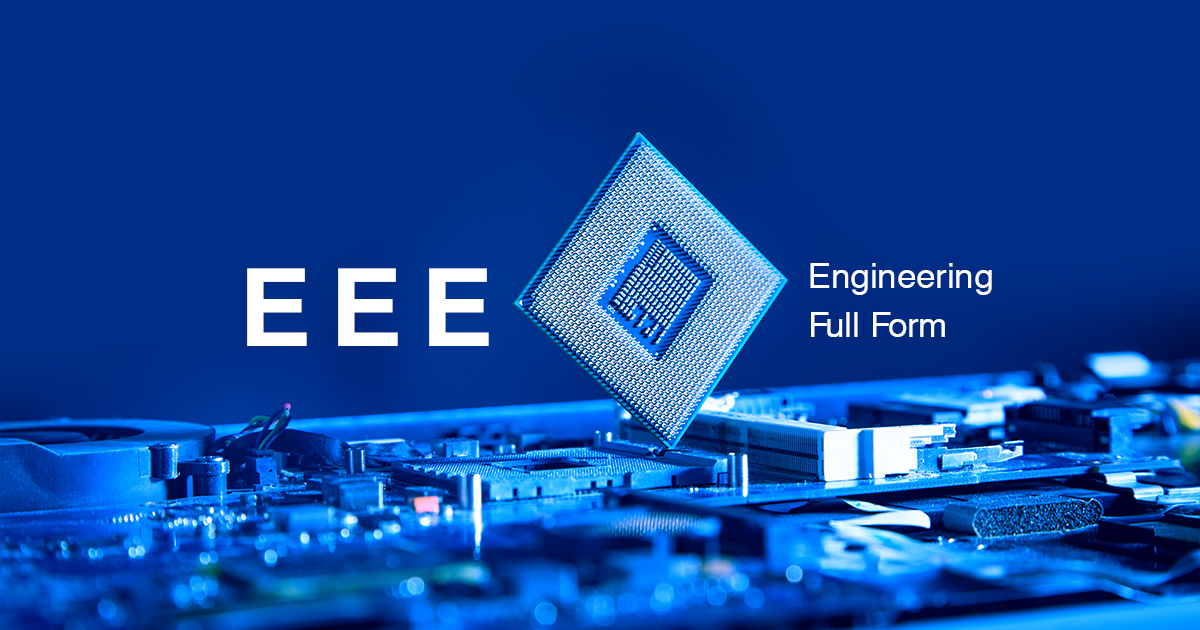FET Blogs


FET Blogs



22 July 2024
The Indian Electrical Equipment industry is projected to grow at a compound annual growth rate (CAGR) of 12%, reaching over $70 billion by 2025. This growth presents promising opportunities, particularly for students pursuing Electrical and Electronics Engineering. In the current era, marked by a significant demand for electronic devices, components, and innovative designs, the range of career options in Electrical and Electronics Engineering, or EEE full form in engineering continues to expand. After graduation, students can find lucrative job opportunities in the fields of power generation, distribution, transmission, energy storage, renewable energy, and energy management. Moreover, as a Research and Development (R&D) engineer, students can also work across diverse industries, including technology, manufacturing, aerospace, consumer goods, energy, chemicals, and healthcare. Let us learn more about EEE in depth:
EEE engineering full form, stands for Electrical and Electronics Engineering. EEE is a specialised branch of engineering that focuses on the study, design, development, and application of electrical systems, devices, and technologies. This field encompasses a wide range of areas, including electrical circuits, power systems, electronics, telecommunications, control systems, and signal processing. Electrical and Electronics Engineering, or EEE full form, focuses on the fundamental principles of electricity, electromagnetism, and electronics. Key details about EEE are summarised below:
|
EEE full form in engineering |
Electrical and Electronics Engineering |
|
Level of Study |
Undergraduate (UG): Bachelor of Technology (BTech) in EEE Postgraduate (PG): Master of Technology (MTech) in EEE) |
|
Duration |
UG: 4 years PG: 2 years |
|
Admission Process |
Admission Examination/ Direct Admission |
In an EEE course, students learn to design and analyse electrical systems, ranging from small-scale integrated circuits to large power distribution networks. The Electrical and Electronics Engineering, or EEE full form in engineering curriculum typically covers subjects such as circuit theory, digital electronics, electromagnetic fields, power electronics, microprocessors, and control systems. This discipline also prepares students to tackle real-world challenges in energy generation, transmission, and utilisation through internships and industrial visits. In this course, students learn about a wide array of topics, including semiconductors, analogue electronics, and power systems. The curriculum also emphasises big transmission lines, digital electronics, electrical machines (both AC and DC), and control systems. A BTech in Electrical and Electronics Engineering, or BTech EEE full form, enables students to apply electrical and electronic principles to circuits, machines, power systems, and control systems. This knowledge will enable them to develop solutions for industrial automation, green energy systems, and smart grids effectively.
Electrical and Electronics Engineering, or EEE full form in engineering offers a variety of specialisations, each focusing on different aspects of the field. Here are some common EEE specialisations:
To enrol for a BTech in Electrical and Electronics Engineering, or BTech EEE full form, students must have passed the Class 12th or Pre-University Course (PUC) or an equivalent qualification from a recognised board. Additionally, students must have secured a minimum of 45% aggregate marks in physics and mathematics, along with chemistry, biotechnology, biology, electronics, or computers. Additionally, candidates must qualify for one of the following entrance exams: the Common Entrance Test (CET), the Consortium of Medical, Engineering, and Dental Colleges of Karnataka (COMED-K), the Joint Entrance Examination (JEE), or the All India Engineering Entrance Examination (AIEEE). For postgraduate admission, the candidate must hold a Bachelor of Technology (BTech) degree in Electrical Engineering with a minimum of 55% aggregate marks from a recognised university. Furthermore, students must qualify for the Graduate Aptitude Test in Engineering (GATE) entrance exam to enrol in a Master's programme.
Electrical and electronics engineering offers extensive career opportunities across various high-paying and rapidly growing industries. Prominent sectors include research and development, automotive, telecommunications, aerospace, and the medical industry. Students pursuing a BTech in Electrical and Electronics Engineering, or BTech EEE full form, are also in demand in the field of robotics. Industries such as manufacturing, education and research, defence, automotive, agriculture, and healthcare offer lucrative and expanding opportunities for skilled robotics engineers. Let us look at some of the potential career prospects in Electrical and Electronics Engineering, or EEE engineering full form:
Electrical and Electronics Engineering presents abundant career opportunities across various industries, driven by the growing demand for skilled professionals adept in power systems, control engineering, and embedded systems. Students pursuing Electrical and Electronics Engineering, or EEE engineering full form, are well-positioned to contribute to sectors ranging from telecommunications to aerospace, leveraging their expertise to advance technologies in renewable energy, automation, and beyond. With structured curricula and rigorous eligibility criteria, EEE programmes prepare students to meet industry challenges and drive innovation in the 21st century. As the global reliance on electronic solutions intensifies, EEE remains at the forefront of technological innovation, offering rewarding career paths and opportunities for impactful contributions to society.
A1: ECE focuses on communication systems, while EEE emphasises power systems; the choice depends on interest.
A2: Yes, Electrical and Electronics Engineering (EEE) is a strong course with prospects in energy and automation.
A3: Yes, EEE involves coding, especially in control systems and automation projects.
A4: Power system analysis is often considered the toughest EEE subject due to its complexity.
A5: EEE has strong future scope in renewable energy, automation, and smart grids.
Popular Post
17 February 2026
AIE Full Form
10 February 2026
AEIE Full Form
22 January 2026
AE Full Form
16 January 2026
What is Aerospace Engineering?
16 January 2026
What is Chemical Engineering?
Ask an Expert for Free